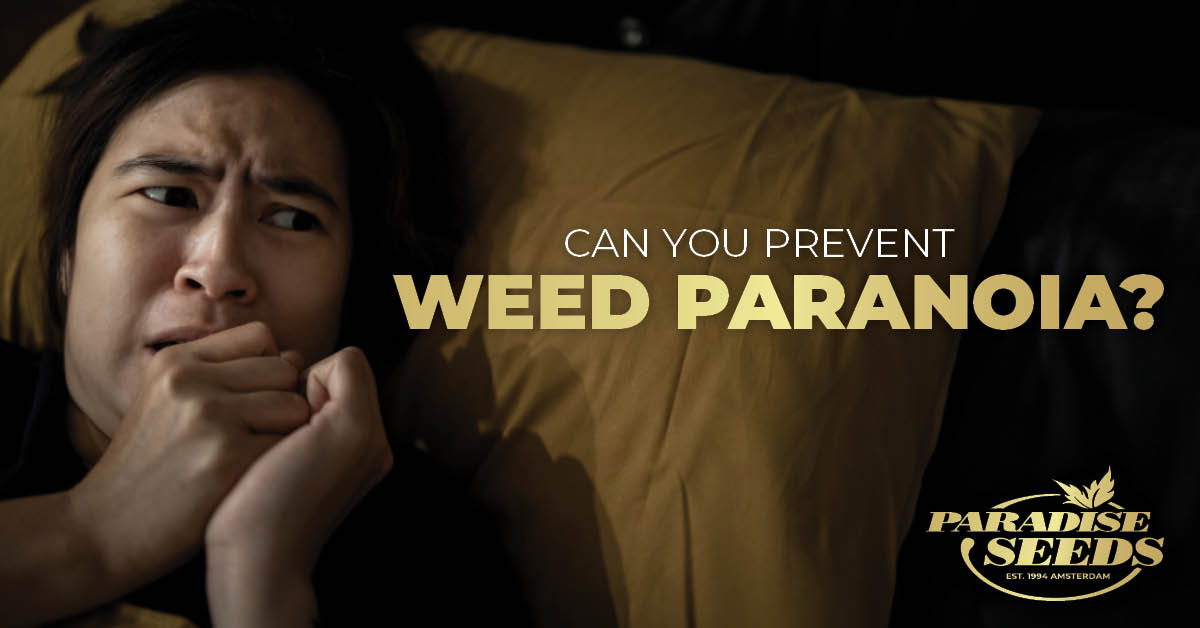For most people who regularly use cannabis, the experience is an enjoyable one, but for some it can be more uncomfortable. One of the more significant negative effects after smoking or consuming edibles is cannabis related anxiety. So this article aims to shed some light on the causes and the question of can you prevent weed paranoia?
What is weed paranoia?
What is weed paranoia? It is normal to have negative thoughts sometimes or become fixated on things we have said or done or that other people have said or done. However, cannabis can amplify these feelings, just as it amplifies other more positive feelings.
As every weed user knows, the cannabis effect is often accompanied by an initial uncaging of random thoughts. After a long day, for example, that first spliff will bring those thoughts bubbling to the surface and inevitably some will be negative too – sometimes causing mild feelings of anxiety as we replay certain actions and interactions. Normally this stage passes quickly and the effect moves onto a more fun/creative/productive/relaxing phase.
However, for some users the weed paranoia levels are raised much higher. Common signs of mild paranoia are worrying about things you’ve said, thinking people may be looking at you or talking about you (especially in social situations). More serious paranoia symptoms could see sufferers going through extreme self-doubt or thinking people are trying to do them harm.
There are a number of causes of cannabis paranoia but common scenarios when it strikes are unfamiliar environments, social situations and carrying out daily interactions and tasks when you really shouldn’t be under the influence… as anyone who has had a bad stoned supermarket experience will empathise with!

What causes cannabis paranoia?
Before we take a look at how to prevent weed paranoia, let’s try to understand why it happens. At the root of cannabis induced paranoia is the amygdala which sits in the middle of the brain and is essentially a processor for emotions which are related to fear (the fight or flight response). These emotions can influence other functions such as the formation of memories, decision-making, and behavior in a social setting.
With more scientific understanding of cannabis, and how it interacts with the body, the endocannabinoid system (ECS) has been shown to have a significant influence on our body processes. Cannabis compounds, such as THC and CBD, are known to bind to certain endocannabinoid receptors which are sited in the brain and these include the amygdala.
Research in the medical journal Science Direct suggests that the flood of THC to these receptors causes the amygdala to become overly stimulated, prompting the paranoia effect.

Other factors contributing to cannabis paranoia
That is the biological cause of cannabis induced paranoia, but there are other factors involved when considering why some people are more prone to weed paranoia than others.
- Your genetic make-up: Just as some people can’t drink alcohol or caffeine or eat certain foods because they ‘don’t agree with them’. The same is true for cannabis. In studies, females are shown to be more prone to paranoia, due to higher levels of oestrogen.
- Too much THC: Cannabis breeding continues to up the percentage of THC (the psychoactive element in cannabis) in many strains and in many cases paranoia results because the weed is just too strong.
In countries where cannabis is legal, one of the big benefits is that there is a wider range of consumer products with lower percentages of THC and more regulation so consumers can be consistent with the right dosage for them which can help to prevent weed paranoia.
The other obvious benefit of legalization is that a space opens up for honest conversation and education around the use of cannabis and its effects on consumers.
How to prevent weed paranoia
- Take less puffs: Regulate the amount of THC you are ingesting by cutting down on the dose. On some occasions cannabis paranoia is the result of too much, too soon, so take less puffs and get less effected to start with. You can always take more puffs later…
- Control the environment: Try to consume weed in a place you are happy to be, physically and emotionally. If socializing, be with people you trust and can depend on and don’t be afraid to voice your fears. Every cannabis consumer can empathize with what you’re going through.
- Go outside: Weed paranoia is often accompanied by a feeling of being closed in. If it strikes, take a short walk outside if you can. Actively engaging your body will help to dilute those paranoid thoughts until the moment passes.
- Breathe: If you can’t escape outside, then take some deep, slow breaths and try to settle your thoughts by acknowledging that the paranoia is a side effect that will pass.
- Eat and drink: Just as with alcohol, consuming cannabis on an empty stomach can amplify the effect. Often eating or drinking (water) helps to settle paranoia. Nevertheless, the old myth is that vitamin C will bring you down if you’re too high is not true according to the science!
Prevent weed paranoia with a lower THC strain
For home growers able to cultivate their own supply, choosing a strain which is lower in THC is a good start to prevent weed paranoia. Cannabis with higher levels of CBD also presents less chance of suffering from paranoia.
Strains with a more balanced THC/CBD profile, for example 1:1 THC/CBD strains (with approximately 10% THC) such as Nebula ll CBD and Durga Mata ll CBD, are less likely to induce paranoia. Another option is to cut THC out of the equation entirely by choosing a High CBD strain like CBDivine or CBDrelax.
Conclusion
As a side effect of consuming cannabis for some people, there may not be a magic bullet to prevent weed paranoia. For most cannabis consumers, the act of acknowledging it and telling oneself that it is the brain overthinking, and that it will soon pass is enough to deal with this uncomfortable side effect.
However, for some cannabis consumers it’s not that simple and the truth is that one has to have an honest conversation about how cannabis is interacting with one’s body. If that means stopping smoking weed, then that’s a decision that should be made in the interests of personal health.
Research suggests that it can take between 14 – 90 days for the body to detoxify cannabis for heavy users, and so, in some cases, paranoia and anxiety can last up to 4 weeks as the body goes through cannabis withdrawal.


